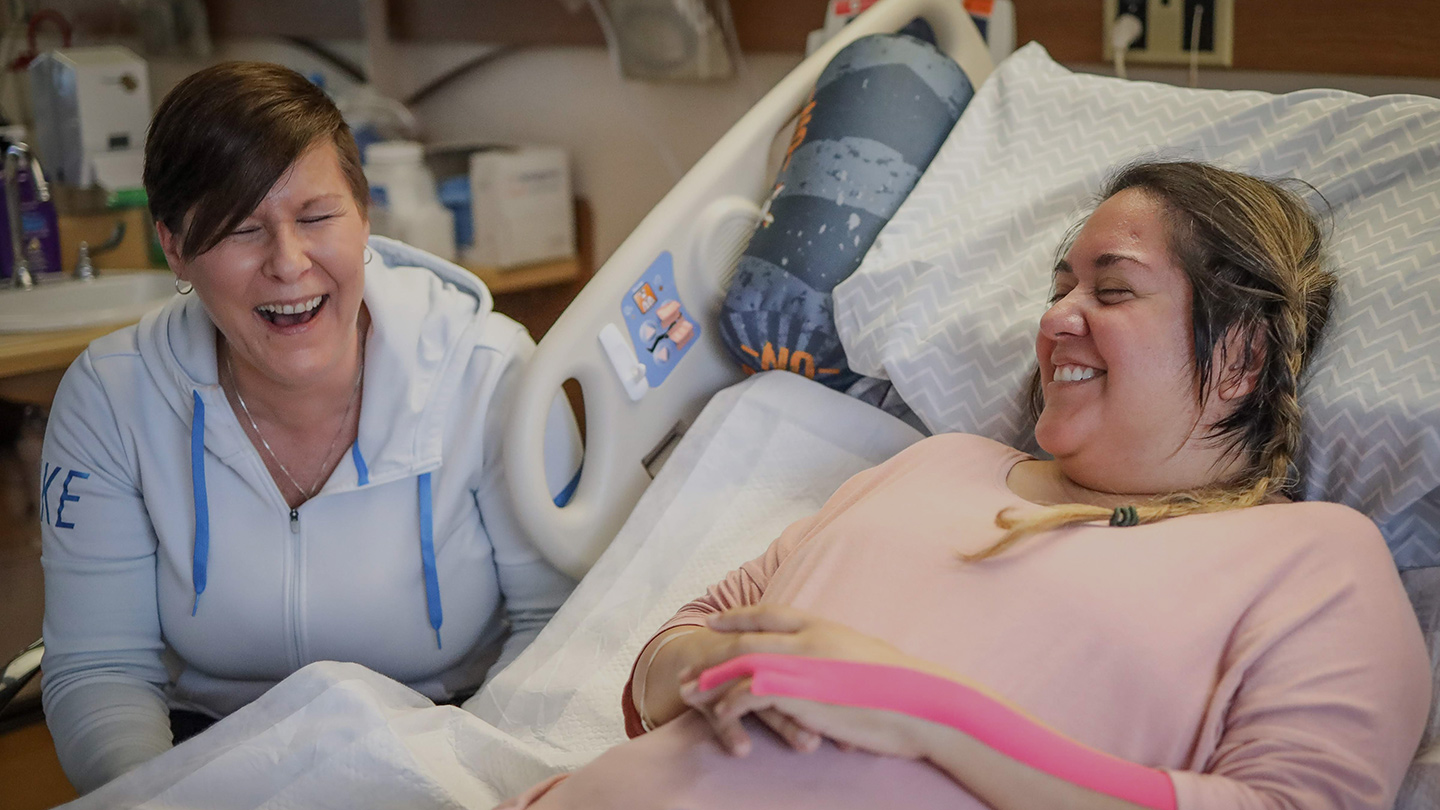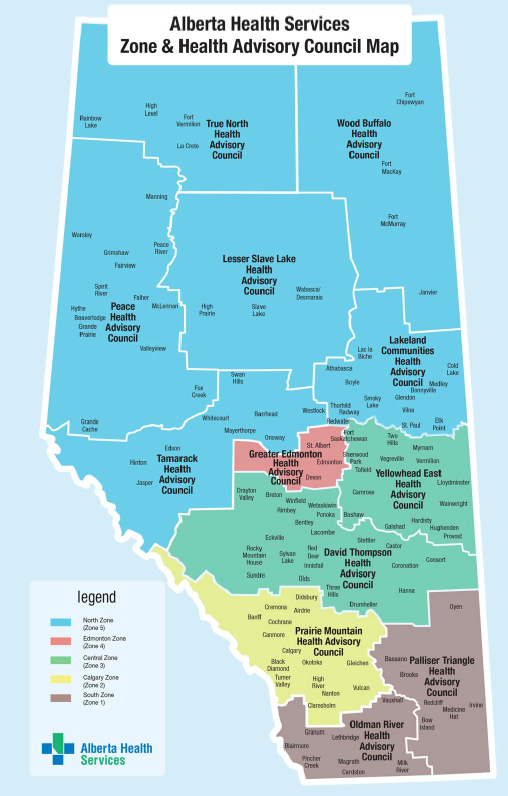
Advisory Councils help bring the voice of Alberta’s communities to healthcare services. Community input allows us to better address the health needs of Albertans and brings decision-making to the local level. AHS is committed to engaging the public in a respectful, open, and accountable manner.
Health Advisory Councils (HACs) work in partnership with the AHS Community Engagement team and zone leaders to bring the local perspective to Alberta healthcare. HACs engage members of the public in communities throughout Alberta and provide advice and feedback from a local perspective on what is working well in the healthcare system and where there are areas in need of improvement. The 12 HACs, which report to the AHS Board, were established in 2009-10 and represent different geographical areas within the province.

Each Health Advisory Council has up to 15 members, with each individual serving three-year terms for a maximum of six years. Recruitment for membership is an ongoing activity as vacancies arise when members complete their six-year maximum terms or leave the councils for other volunteer opportunities. The 2019-20 fiscal year marked the 10-year anniversary of HACs in Alberta. A review was launched which led to nine months of engagement involving 30 conversations with 17 different stakeholder groups. As a result, AHS is introducing HAC 2.0, a new model that will bring role clarity, strengthen partnerships between councils and AHS, expanded community engagement efforts, and enhance council satisfaction.
Addiction and Mental Health Provincial Advisory Council advises AHS on programs and services for province-wide addiction and mental health treatment. It provides recommendations from the system-access perspective that seeks to improve quality of services and patient satisfaction. For example, council members participated in reviewing and ranking grant applications in 2019-20 and provided a lens of lived-experience to help improve the use of addiction and mental health research for system and service delivery planning.
Cancer Provincial Advisory Council provides advice related to priorities for cancer services, including screening and prevention, diagnosis, treatment and care, and research and draws upon others’ knowledge as required. Members are experts in cancer-related fields, have a loved one touched by cancer, or are cancer survivors. Over the past year, council members supported the introduction of a provincial population-based screening program for lung cancer based on statistics related to the impact of screening and also wrote a letter of support for the proposed phased implementation of the program.
Seniors and Continuing Care Provincial Advisory Council aims to improve the delivery of AHS services to seniors and those in the continuing care system (home care, designated supportive living, and long-term care) across Alberta. For example, in 2019-20, council members reviewed the Alberta Continuing Care Facility Directory in advance of its launch and provided feedback that sought to improve usability of the website so Albertans can easily find information about care for themselves and family members.
Sexual Orientation, Gender Identity and Expression Provincial Advisory Council aims to create a safer and more welcoming healthcare environment for sexual and gender minority (lesbian, gay, bisexual, transgender, queer, and 2 Spirit, or LGBTQ2S+) patients and their families. Over the past year, the council developed a practical tool for AHS employees, physicians, volunteers, and contracted service providers to support the creation of safer and more welcoming care for LGBTQ2S+ patients and their families.
Advise AHS on programs and services for province-wide addiction and mental health treatment; provides evidence-based recommendations that improve quality of services and patient satisfaction through effective service planning.
Advise AHS on programs and service for province-wide cancer care; provides evidence-based recommendations on prevention and screening, diagnosis, treatment and care, and research.
Launched in January 2018; aims to improve the delivery of services to seniors and those in continuing care (long-term care and designated supportive living) across Alberta
Launched in early 2019; members have lived experience within the healthcare system and understand the needs and barriers faced by sexual and gender minority communities; work of the PAC helps create a safer and more welcoming healthcare environment for sexual and gender minority (lesbian, gay, bisexual, transgender, queer, and 2 Spirit or LGBTQ2S+) patients and their families
Wisdom Council provides guidance and recommendations on the development and implementation of culturally appropriate and innovative health service delivery for Indigenous Peoples. It is comprised of Indigenous Peoples with wide-ranging backgrounds, including traditional knowledge-holders, youth, nursing professionals, and health consultants. In 2019-20, the council revised its terms of reference to recognize knowledge keepers as distinct members within the Wisdom Council Elders Circle. Elders can now opt to continue to serve after their membership term ends by providing guidance to all Alberta Health Advisory Councils, including to continue as members on the Wisdom Council. This council also remains committed to helping AHS understand the importance of how and why there is a need to implement Truth and Reconciliation calls to action and the principles of the United Nations Declaration on the Rights of Indigenous Peoples.
Alberta Clinician Professional Practice Council is a forum for clinicians to share knowledge, experience, and expertise to inform decision-making on key AHS programs. The council consists of frontline clinician members, senior operational leaders, and practice leaders. Its role is to advise and give feedback on strategies related to patient outcomes, access, clinical practices, quality healthcare, and patient safety. Feedback gathered in 2019-20 will help guide, design, and form strategies, resources, and services across the organization.
Patient and Family Advisory Group is a committee of patients and family members from across Alberta, who volunteer their time and experience to improve the quality, safety, and experience of healthcare services. Together with senior and executive leaders, physicians, clinicians, and clinical support teams, advisors work to ensure the voices of patients and families are included in the design and planning of policies (e.g., family presence and visitation policies) and services within AHS. In 2019-20, group members represented patients and families during the AHS Performance Review by providing a lens of lived-experience, which was imperative to gaining an accurate, holistic understanding of the organization. Group members continue to be involved in the improvement and implementation work that resulted from the review.
Strategic Clinical Networks (SCNs) bring together clinicians, researchers, patients, and policymakers to drive innovation and research, standardize care, share best practices, improve access to services, and improve health system sustainability. AHS SCNs partner with approximately 140 patient and family advisors who bring the voice of patients and families to their work. Advisors are involved as core committee members, working group members, leadership meeting members, and Patient & Community Engagement Researchers (PaCERs). SCN advisors also participate in Patient Engagement Reference Group (PERG) meetings to facilitate consultations, networking, and partnership-building between advisors and SCN leaders.